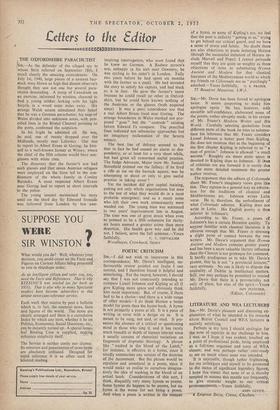Letters to the Editor
THE OXFORDSHIRE PARACHUTIST (SIR,—As the defender of the alleged spy to whom Strix referred on September 18th, I recall clearly the amazing coincidences. On July 1st, 1940, large pieces of a nascent hay- stack were blown so high that distant observers thought they saw not one but several para- chutes descending. A troop of Canadians on an exercise, informed by wireless, chanced to find a young soldier lurking with his light bicycle in a wood some miles away. His strange Welsh accent stimulated their belief that he was a German parachutist; his map of Wales divided into unknown areas, with pen- cilled lines in the Bristol Channel pointing to the ports, confirmed the suspicion.
In his fright he admitted all. He was, ,he said, one of twenty dropped over the Midlands, mostly near Leicester. One wa's to report to Albert Evans at Goring; he him- self to a well-known farmer at Witney, where the chief of the fifth column would have sun- glasses with white rims.
The discovery that the farmer's son had such glasses and that seven Austrian refugees were employed on the farm led to the con- finement of the whole family in Cowley Barracks. A most respected Albert Evans near Goring had to report at short intervals to the police.
The young suspect maintained his story until on the third day Sir Edmund Ironside was followed from London by less awe- inspiring interrogators, who soon found that he knew no German. A Radnor parson's son, unhappy in his unit near Oswestry, he was cycling to his sister's in London. Fully two years before he had spent six months with the farmer as a pupil. He had invented the story to satisfy his captors, and had stuck to it in fear. He gave the farmer's name because he could recall no other in Oxford- shire, but he could have known nothing of the Austrians or the glasses (both acquired since). It was a pure coincidence too that a real Albert Evans lived near Goring. The strange boundaries in Wales marked not pro- posed " gaus " but the " cantreds " existing before Edward l's conquest. The pencilled lines indicated not submarine approaches but an imaginary reclamation of the Severn estuary.
The best line of defence seemed to be that in fact he had caused no alarm or des- pondency, or at least for a very short while, but had given all concerned useful practice. The Judge Advocate, Major (now Mr. Justice) Streatfield pointed out the fallacy: if he fired a rifle at me on the barrack square, was he attempting to shoot or only to give useful practice in taking cover ?
Yet the incident did give capital training, putting not only whole organisations but men to the test of what they would do in a most probable emergency; and as a result some who left their own work unnecessarily were weeded out. The young man was sentenced to two years' imprisonment late in August. The time was one of great strain when even to pretend to be a fifth columnist for thirty- six hours seemed a greater crime than mere desertion. His health gave way and he did not, I believe, serve the full sentence.—Yours


















































 Previous page
Previous page